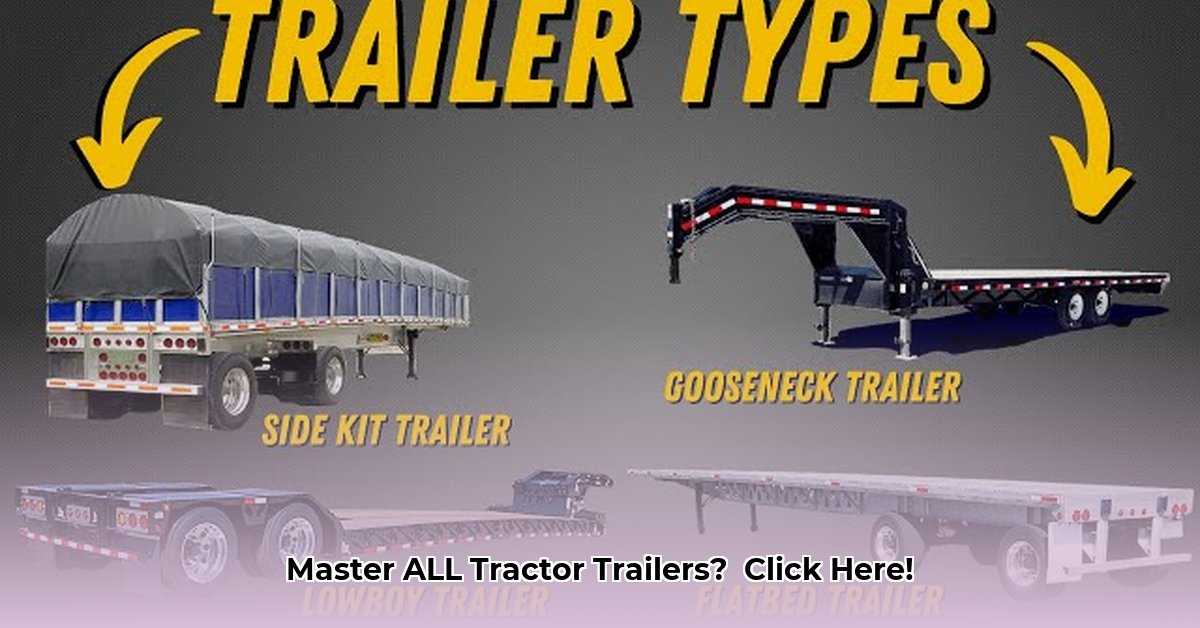
The trucking industry relies on a diverse fleet of tractor-trailer combinations, each designed for specific cargo and operational needs. Choosing the right trailer is critical for efficiency, safety, and profitability. This comprehensive guide explores various trailer types, their applications, and future trends, empowering you to make informed decisions. For the latest news on trucking accidents, see this report.
Different Tractor Trailer Types: A Comprehensive Overview
This section details the most common tractor-trailer types, highlighting their strengths and weaknesses. Understanding these distinctions is crucial for selecting the optimal trailer for your specific needs. What are the key characteristics that differentiate these vehicles, and how do these differences impact your choice?
Dry Van Trailers: The Versatile Workhorses
Dry van trailers are the most ubiquitous type, essentially large, enclosed boxes on wheels. Their enclosed design protects cargo from the elements, making them suitable for a wide range of goods, from packaged consumer products to furniture. Their simplicity and ease of maintenance contribute to their widespread use. However, their lack of specialized features limits their applicability for certain types of cargo. Did you know that dry van trailers account for approximately 60% of all trailers on the road?
Refrigerated Trailers (Reefers): Maintaining Temperature-Sensitive Cargo
Refrigerated trailers, or reefers, are equipped with refrigeration units to maintain precise temperatures, essential for transporting perishable goods. Fruits, vegetables, meat, pharmaceuticals, and other temperature-sensitive items rely on reefers to ensure quality and safety during transit. The technology within these trailers is constantly evolving, offering enhanced temperature control and monitoring capabilities. How have advancements in refrigeration technology improved the efficiency and reliability of refrigerated transport?
Flatbed Trailers: Hauling Oversized and Irregular Loads
Flatbed trailers offer an open, flat deck perfect for hauling oversized, heavy, or oddly shaped cargo that won't fit inside an enclosed trailer. Construction materials, heavy machinery, and even manufactured homes are frequently transported on flatbeds. Their open design requires careful load securing, highlighting the importance of proper techniques and equipment. The versatility of flatbeds makes them indispensable for many industries, but their open design leaves cargo vulnerable to the elements. What specific load-securing techniques are crucial for safe flatbed transport?
Tank Trailers: Specialized Transport for Liquids and Gases
Tank trailers are designed to transport liquids and gases in bulk. Gasoline, chemicals, milk, and other liquids find their niche in these specialized trailers. Strict safety regulations govern their design and operation due to the potential hazards associated with their cargo. These regulations are constantly evolving to minimize environmental risks and ensure driver safety. Why are stringent safety regulations so critical for the operation of tank trailers?
Specialized Trailers: Tailored Solutions for Unique Needs
Beyond the standard types, numerous specialized trailers cater to diverse transportation needs. These trailers are purpose-built to handle specific types of cargo or operational challenges, demonstrating the adaptability and innovation within the trucking industry.
| Trailer Type | Description | Typical Cargo |
|---|---|---|
| Lowboy Trailers | Extra-low bed for oversized or heavy equipment requiring increased ground clearance. | Heavy machinery, construction equipment |
| Step-deck Trailers | Two-level deck for loads that are both tall and heavy. | Long and heavy cargo requiring varying load heights |
| Extendable Trailers | Adjustable length for varying cargo sizes. | Building materials, pipes, long lengths of material |
| Double-drop Trailers | Extra-low loading platform for extremely heavy and oversized equipment. | Extremely heavy and oversized industrial equipment |
| Livestock Trailers | Designed for humane animal transport with ventilation and climate control. | Cattle, sheep, pigs, and other livestock |
| Car Carriers | Transports multiple vehicles simultaneously. | Automobiles, motorcycles, and other vehicles |
The Future of Semi-Trailers: Innovation on the Horizon
The trucking industry is constantly evolving, driven by technological advancements and sustainability concerns. We can expect to see further integration of lightweight composite materials in trailer construction, reducing fuel consumption and environmental impact. Automation, including autonomous driving systems, is rapidly shaping the future of trucking, promising enhanced safety and efficiency. "The future of semi-trailers hinges on advancements in sustainable materials and automation," says Dr. Anya Sharma, Professor of Transportation Engineering at MIT. What other emerging technologies are likely to revolutionize trailer design and operation?
Choosing the Right Trailer: A Step-by-Step Guide
Selecting the appropriate trailer involves careful consideration of various factors, ensuring optimal efficiency and safety. This step-by-step guide streamlines the decision-making process.
- Analyze Your Cargo: Determine weight, dimensions, fragility, hazardous material classification, and any special handling requirements.
- Assess Operational Needs: Consider load/unload frequency, delivery distances and routes, and any specific logistical challenges.
- Ensure Regulatory Compliance: Understand and adhere to all applicable regulations concerning dimensions, weight limits, and hazardous materials.
- Evaluate Total Landed Cost: Calculate purchase or lease costs, maintenance, fuel efficiency, and any potential operational expenses.
- Select the Optimal Trailer: Choose the trailer that best aligns with your cargo characteristics, operational needs, and regulatory requirements.
This detailed guide offers a comprehensive overview of various trailer types, providing the necessary insights for making informed choices. By carefully considering all relevant factors, you can select the perfect trailer to streamline your operations and achieve optimal results.